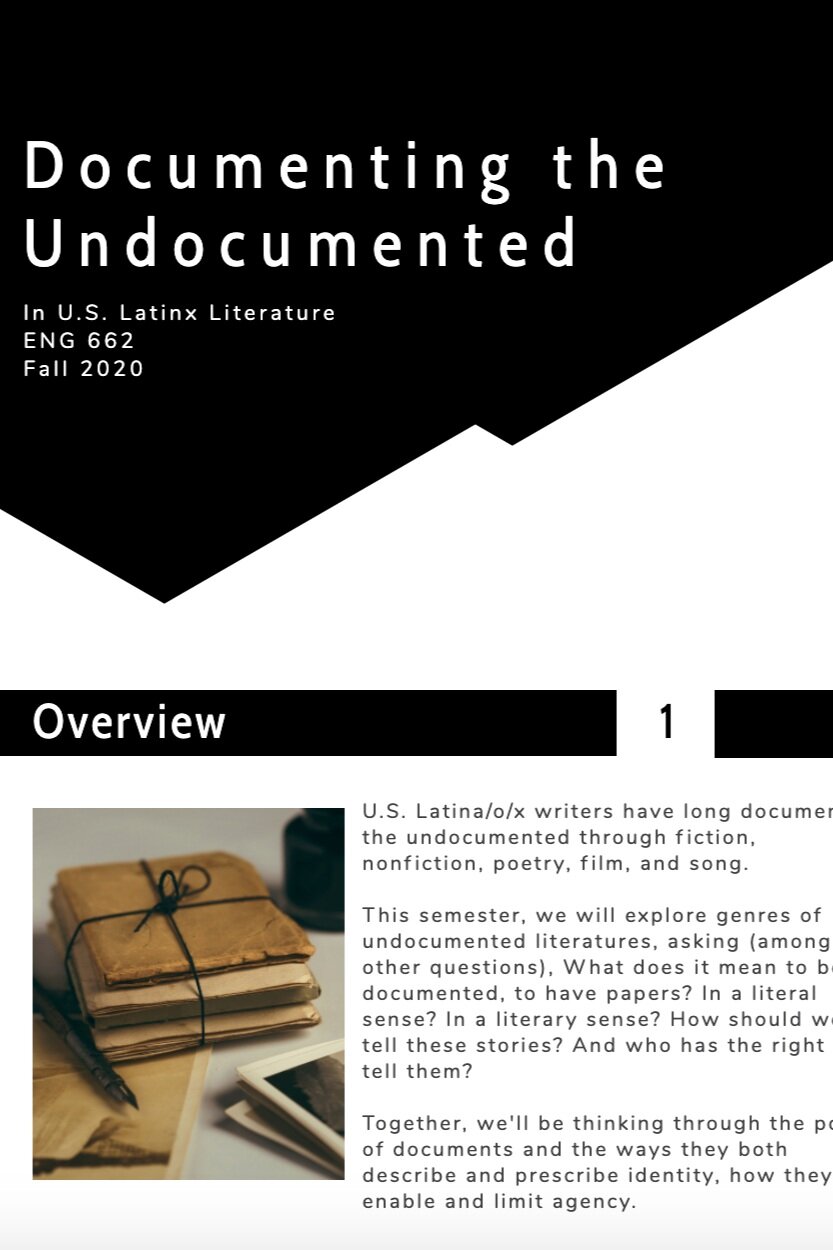Sample Syllabi
(Click the image for full syllabus)
More Sample Course Descriptions
(Full Syllabus Linked in Title)
“I have to declare in all candor that no one interested in being published in our time can afford to be so naive as to believe that a book will make it merely because it's good.” Literary agent Richard Curtis’s dream-deflating claim about the contemporary American publishing industry prompts an important question: what stands between a good book and “making it”? While there are undoubtedly multiple answers to this question, in this course, we will examine the way race and ethnicity condition a text’s position and reception in American literary culture. We will ask, how do concepts of race and ethnicity shape the publishing process? What issues do American authors from historically marginalized groups face as they pursue print publication? What expectations do editors, publishers, and readers have for those authors and their texts? And what do these issues and expectations tell us about the current state of identity in American literature?
We will examine questions of material loss and recovery, book banning and other kinds of censorship, and the various factors at work in deeming work by ethnically identified writers “authentic” or “inauthentic.” We will study texts by authors whose voices are subverted by the interests of publishers and readers and vice versa.
In this course we will explore the phenomenon of the 20th- and 21st-century unfinished American novel. The frequent occurrence of posthumous editing in American literature gives us an opportunity to think through some of the philosophies of critical editing, asking how an author’s intentions can be satisfied – and whether or not they need to be – when he or she is no longer around to tell us what those intentions are. We’ll also reflect on some fundamental questions about the shape books take once editors and writers set out to complete these unfinished works: what can the various posthumous editing projects of the 20th and 21st century tell us about the responsibility editors feel toward an author’s text? Who is responsible for finishing the work? What philosophy of the text does the editor subscribe to, and how does his or her editing of the text demonstrate that philosophy? Does the posthumously edited book belong to the author or somebody else? How do audiences react to these completed books? And who has final say over when the book is complete? Throughout our conversations, we will pay special attention to the way racial and ethnic identity shape the possibilities for posthumous publication, particularly as those identities intersect with class, gender, and sexuality.
Building and Sharing Knowledge
In the news:
How Technology Enhances Literature Learning, Mark Lieberman, Inside Higher Ed, 2018
“The Wall Film Comes to Staunton.” Jeremiah Krupp, Staunton News Leader, 2018.
Presentations:
“Teaching Diversity, Inclusion, and Activism in General Education Courses.” James Madison University 11th Annual Diversity Conference. March 15, 2017.
"Teaching the Border." Cultura y comunidad: Mirando hacia Mexico. Workshop for the Rockingham County and Harrisonburg City Educational Community. April 18, 2013.
Training and Development:
JMU EPIC (Enhancing Pedagogy through Innovative Classrooms) Pilot Teaching Program, 2015
JMU Digital Storytelling Workshop, 2014-2015
JMU Google Earth in the Classroom Workshop, 2013
“Digital tools can help students see more traditional learning materials in a new light, as in a course on literature by undocumented immigrants taught by Allison Fagan, associate professor of English at James Madison University in Virginia.
— Mark Lieberman”







